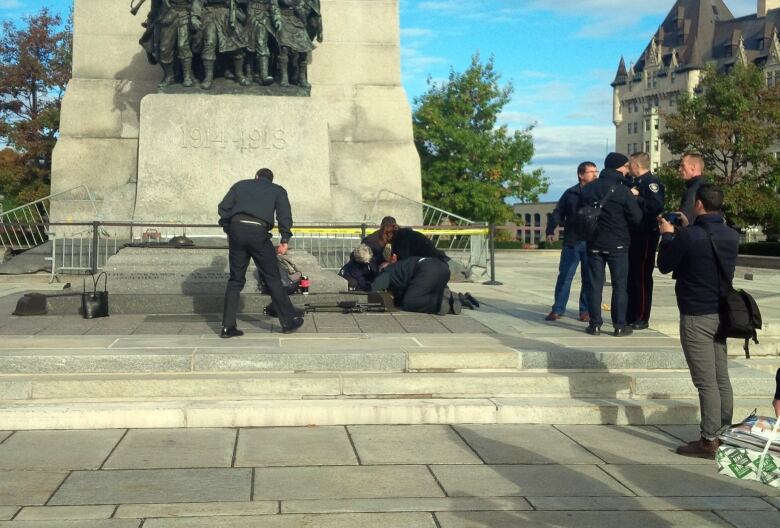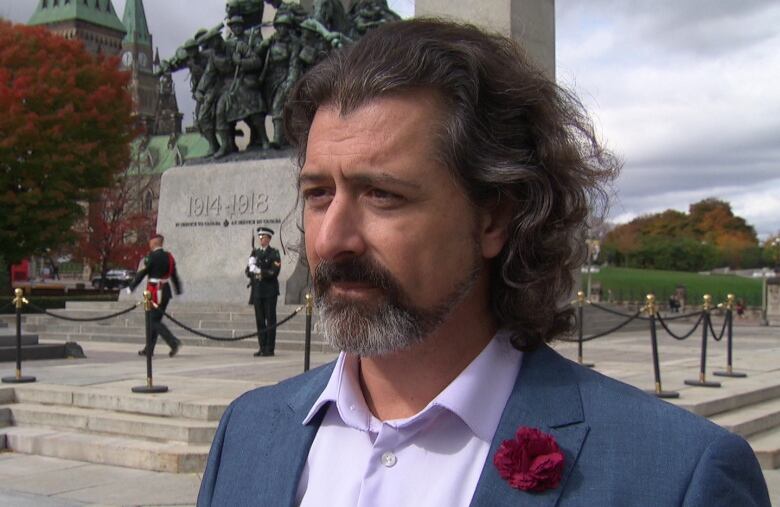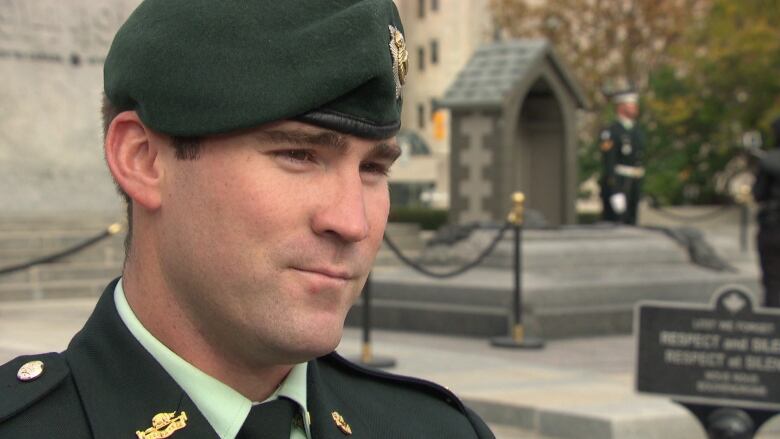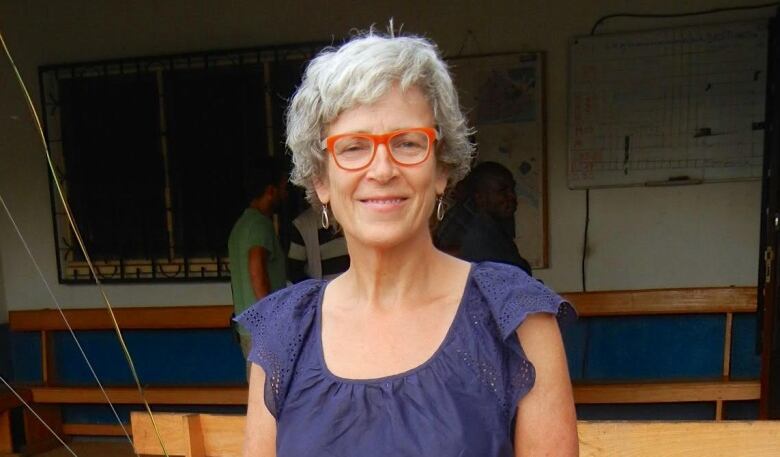After Ottawa shooting, 6 people still bound by effort to save Cpl. Nathan Cirillo
'We understand what it was to be there and we can talk about it,' says man who attended dying soldier
The six people who rushed to Cpl. Nathan Cirillo's side to try to keep him alive as he lay dying in the shadow ofthe National War Memorial remain connected by the shock of thatday one year later.

"No one elsenot your husband, not your best friendreally can understand what you went through, other than those five people," said former nurse Margaret Lerhe, who was one of the first to arrive, in an interview this week.
"I truly believe that we'll be friends. I just can't imagine it, drifting apart. We'll always have Oct. 22 to commemorate."
At 9:50 a.m. on Oct. 22, 2014, gunman MichaelZehaf-BibeauapproachedCirillofrom behind and shot him three times.
The six people who stopped to help have met several times since thenand still keep in touch.
We found solace in each other's words.We understand what it was to be there and we can talk about it, and we can talk about the experiences coming out of it.Martin Magnan
"We found solace in each other's words,"said MartinMagnan,also one of the first to reachCirillo, in an interview at the memorialin the days leading up toOct. 22.
"We understand what it was to be there and we can talk about it, and we can talk about the experiences coming out of it. We can talk about where our lives are going and how it's impacted us, and we get it."
'Everyone showed up within seconds'
Cpl. Kyle Button, whowas the third man onguard at the memorialthat day, was the first todropto the ground next to Cirillo to beginfirst aid after the shots were fired.
Magnan, a communications adviser for the Department of National Defence at the time, was heading to a meeting when he heard the shotsand immediately ran toward them, helpingButton treat Cirillo when he got there.

"After that ... everyone showed up within seconds of each other. A rhythm established itself, CPR took place and we were talking amongst ourselves. It just kind of happened," Magnan said.
The third person to arrive wasLerhe, who was also on her way to a meeting. She briefly thought the shooting was a training exercise before realizing there was no one observing them.
Col. Conrad Mialkowski, whowas driving by when heheard the shots anddrove his vehicle up onto the sidewalk,was the fourth to arrive at Cirillo's side.The fifth was Cpl. Anthony Wiseman, driver of the chief of the defence staff, and the last to arrive was lawyerBarbara Winters, a former naval reservist.
Winters spoke words of comfort to Cirillo,unsure if theygot through, as Cirillo wasn't conscious, but even as the paramedics arrived she kept speaking to him, telling himhow loved he was.
When Ottawa paramedics arrivedCirillo was rushed to hospital,but he died of his wounds.
Lonely moments
Magnan describes the minutes after paramedics wheeled Cirillo away as some of the loneliest of his life. He sat on the mount of the Tomb of the Unknown Soldier and looked up at the bronze sculpturesofthe memorial arch.
"When I'm looking up, and it's just the monument and you see these soldiers it was the coldest moment of my life. Just a very still, lonely cold, because then you start realizing what took place," Magnan said.
"This is a personal spot for me now. It's always going to be part of me, here. My kids understand it's a part of me."
Eventually the six responders were taken from the memorialto Ottawa police headquarters on Elgin Street to be interviewed.
'I don't know if there can ever be closure'
Button, now a master corporal based at CFB Gagetown in New Brunswick, has been back in Ottawa since Sept. 22, serving as a posting corporal at the memorial. He accompanies the two ceremonial guards to their posts near the Tomb of the Unknown Soldier.
He'll alsoattend a memorial ceremony today marking one year since the attack that killed his colleague.

He callshis fellow first respondershis friends, and while he'll be glad to see Cirillo's family again, he said the ceremony won'tchange what happened last year.
"I don't know if there can ever be closure," Buttonsaid in an interview at the memorial Wednesday.
"It's always going to be something in my life. This place is always going to mean something on this day, and I'm sure ... for the rest of my life, the 22nd of October will definitely be a day I'll never forget.
"When you're on deployment you're expecting something like that. When you're here, the sounds of gunshots, the experience of trauma, it's a lot more surprising."
Button hopes to one day stand at the memorial for sentry duty again.
'I was an emotional wreck'
Lerhekept herself busy in the days following the shooting andfocusedon others, but finallybroke down while finishing up a course in Victoria, alone.

"I just completely lost it and I was an emotional wreck, so when I came back to Ottawa I had to see somebody. I had to see a professional," she said. "You can't run from pain, you have to deal with it. And that's what I had been trying to do, I think, by keeping busy and looking after the course and my friend."
The best help came from reaching out to the five who sat next to her that day, feverishly trying to keep Cirillo alive.
"That, probably, was our godsend, because we still email frequently. I send them a big email every three weeks about what's going on and I hear back from them. I think we'll remain friends forever now. We're all very different, but we're all very connected now," Lerhe said.
Before the shooting, Lerhe had been tempted to join Doctors Without Bordersbut never took the plunge.
Cirillo's"senselessdeath" became the catalyst for changing her life, she said.
"Nathan's death made me realize, life is too short.I just felt that I had something to give, in a greater capacity than in my former work," she said."I wanted to do something for humanity. I wanted to contribute in a meaningful way."
Lerhe is now three months into a nine-month contract with Doctors Without Borders in Zemio, a small townin Central African Republicnear the border with Democratic Republic of Congo and South Sudan.













_(720p).jpg)


 OFFICIAL HD MUSIC VIDEO.jpg)
.jpg)



























































































